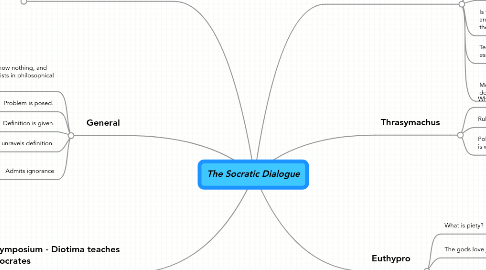
1. General
1.1. Professes to know nothing, and engages Sophists in philosophical debates.
1.2. Problem is posed.
1.3. Definition is given.
1.4. Finds minor flaws; unravels definition.
1.5. Admits ignorance
1.5.1. Agrees to work with the Sophist (in this case, Thrasymachus) on finding the "Truth".
2. Thrasymachus
2.1. What is justice?
2.1.1. Might makes right.
2.2. Rulers make bad laws.
2.3. Polemarchus says that the Truth is wrong.
3. Euthypro
3.1. What is piety?
3.1.1. That which is loved by the gods.
3.1.1.1. Some things loved by some gods.
3.2. The gods love just human actions.
3.2.1. Is it loved because it is holy, or is it holy because it is loved?
3.3. Give a service to the gods.
3.3.1. Prayers only ask of them.
3.3.2. Sacrifices only give back to them.
4. Symposium - Diotima teaches Socrates
4.1. Love starts with a love of physical things.
4.1.1. Because a love of virtue...
4.1.1.1. - Courage
4.1.1.2. - Temperance
4.1.1.3. - Prudence
4.1.1.4. - Justice
5. The Meno - What is virtue?
5.1. The power of governing mankind.
5.1.1. Must include justice.
5.1.2. Doesn't apply to the powerless people (children, slaves, etc.)
5.2. Nature, teaching, and practice.
5.3. No one remembers it; it's in the other realm.
5.4. Anything that one thinks it is... "Man is the measure of all things."
5.5. Is the desire of things honorable and the power of attaining them.
5.6. Temperance and justice are essential to having virtue.
5.7. Meno asked for a general definition as an example.
5.7.1. Figure and color
5.7.1.1. Color is the limit of a solid.
5.7.1.2. Figure is the only thing which follows color.
6. How Plato combines previous philosophies
6.1. Plato
6.1.1. Socrates
6.1.1.1. Socratic Method
6.1.2. Parmenides
6.1.2.1. World of Being
6.1.3. Pythagoras
6.1.3.1. Math is the best guide.
6.1.4. Heraclitus
6.1.4.1. World of Becoming
